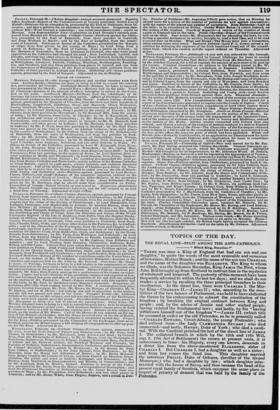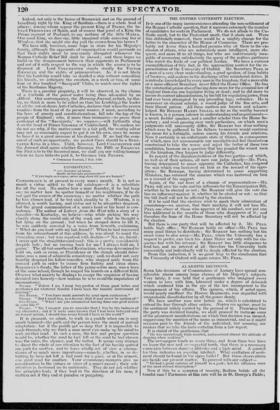THE ROYAL LINE—SPLIT AMONG THE ANTI-CATHOLICS.
TOPICS OF THE DAY.
" Which King, Besonlan In "THERE was once a King of England that had one son and one daughter," to quote the words of the most venerable and veracious of historians, Mother Bunch ; and the name of the son was CHARLES, and the name of the daughter was ELIZABETH. The King to whom we allude, was the Solomon Secundus, King JAMIE the First, whom John Bull brought up from Scotland to instruct him in the mysteries of witchcraft and kingcraft. The posterity of this monarch have been frequently adverted to within the last ten days ; and we shall do our readers a service by recalling the three principal branches to their recollection. In the direct line, there were CHARLES I. the Mar- tyr King—CHARLES II.—JAMES II ; who, according to the reso- lutions of the two houses of Parliament, was held to have abdicated the throne by his endeavouring to subvert the constitution of the kingdom ; by breaking the original contract between King and people ; and, by the advice of Jesuits and other wicked people, having violated the fundamental laws ; and lastly, by his "having withdrawn himself out of the kingdom"* —JAMES III. -(which title he assumed in exile) or the old Pretender, as he is generally called —CHARLES EDWARD, Count Albany, the young Pretender; who died without issue—the Lady CLEMENTINA STUART ; who died unmarried—and lastly, HENRY, Duke of York ; who died a cardi- nal. With the Cardinal perished the last of the direct line of JAMES I. The collateral branch in which by the 12th and 13th Will. cap. 2. (the Act of Settlement) the crown at present vests, it is unnecessary to trace : his Majesty, every one knows, descends in a direct line from the above-mentioned ELIZABETH, sister of CHARLES I. But CHARLES I. had a daughter as well as a sister; and from her comes the third line. This daughter married the notorious PHILIP, Duke of Orleans, (brother of the Grand Monarque,) who had a daughter by her ; which daughter inter- married with the house of Savoy, and thus became the head of the present royal family of Sardinia, which occupies the same.place in respect of priority of descent that was held by the family of the Pretender, Indeed, not only is the house of Brunswick met on the ground of hereditary right by the King of Sardinia—there is a whole host of others ; among, whom appear the present King of France, the be- loved FERDINAND of Spain, and of course that jewel of a King the Prince regnant of Portugal, to say nothing of the little MARIA. Our good King, we dare say, little imagined while caressing her at Windsor, that she • might one clay pull the crown from his brows ! We have still, however, some -hope in store for his Majesty's family, although the opponents of emancipation would persuade us that their rights must be necessarily abrogated whenever the Roman Catholic Relief Bill shall be passed ; and these hopes we build on the disagreement between their opponents in Parliament and out of it with respect to the way in which the crown is to be disposed of. Lord COLCHESTER stands stoutly for VICTOR EMANUEL and the rights of primogeniture. As it is not likely that his Lordship would take so decided a step without consulting his friends, we anticipate the creation, in a week or two, of some four or five hundred , "Savoyard" Clubs, to watch over the rights of his Sardinian Majesty. There is a peculiar propriety, it will be observed, in the claims of a Catholic of the purest water being thus advocated by an Abbott. Our contemporary, the Morning Journal, (which, by-the- by, we think is more to be relied on than his Lordship,) the leader of all the out-of-doors Anti-Catholics, declares that when the crown tumbles from the head of its present wearer, it must, according to the laws of gravity and constitutionalism, fall into the lap of the people of England ; who, it more than insinuates—to prove their contempt of the " Savoyards," we suppose,—will forthwith clap it on the head of Prince GEORGE of Cumberland. We confess we do not see why, if the matter come to a fair poll, the worthy editor may not as reasonably expect to put it on his own, since he seems to have it in a great measure at his disposal. If we had the com- mand of such an opportunity, we protest there should be a SPEC- TATOR KING in a trice. Until, however, Lord COLCHESTER and the Journal shall agree whether GEORGE the Fifth or EMANUEL the First is to be the favoured man, we shall pay our willing homage where we have hitherto paid it, to GEORGE THE FOURTH.
* Commons Journal, 7 Feb. MSS.



















 Previous page
Previous page